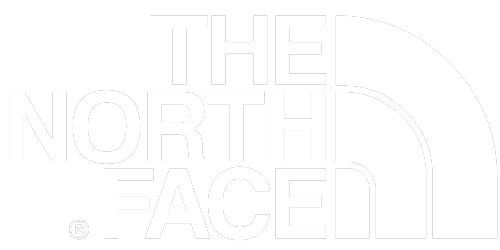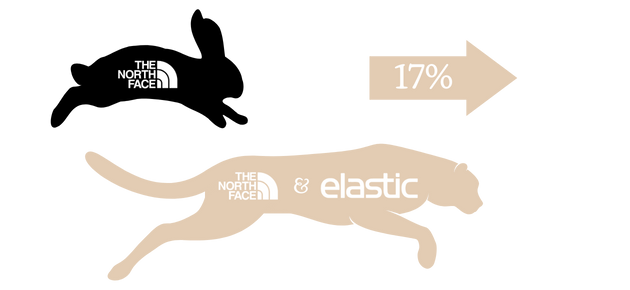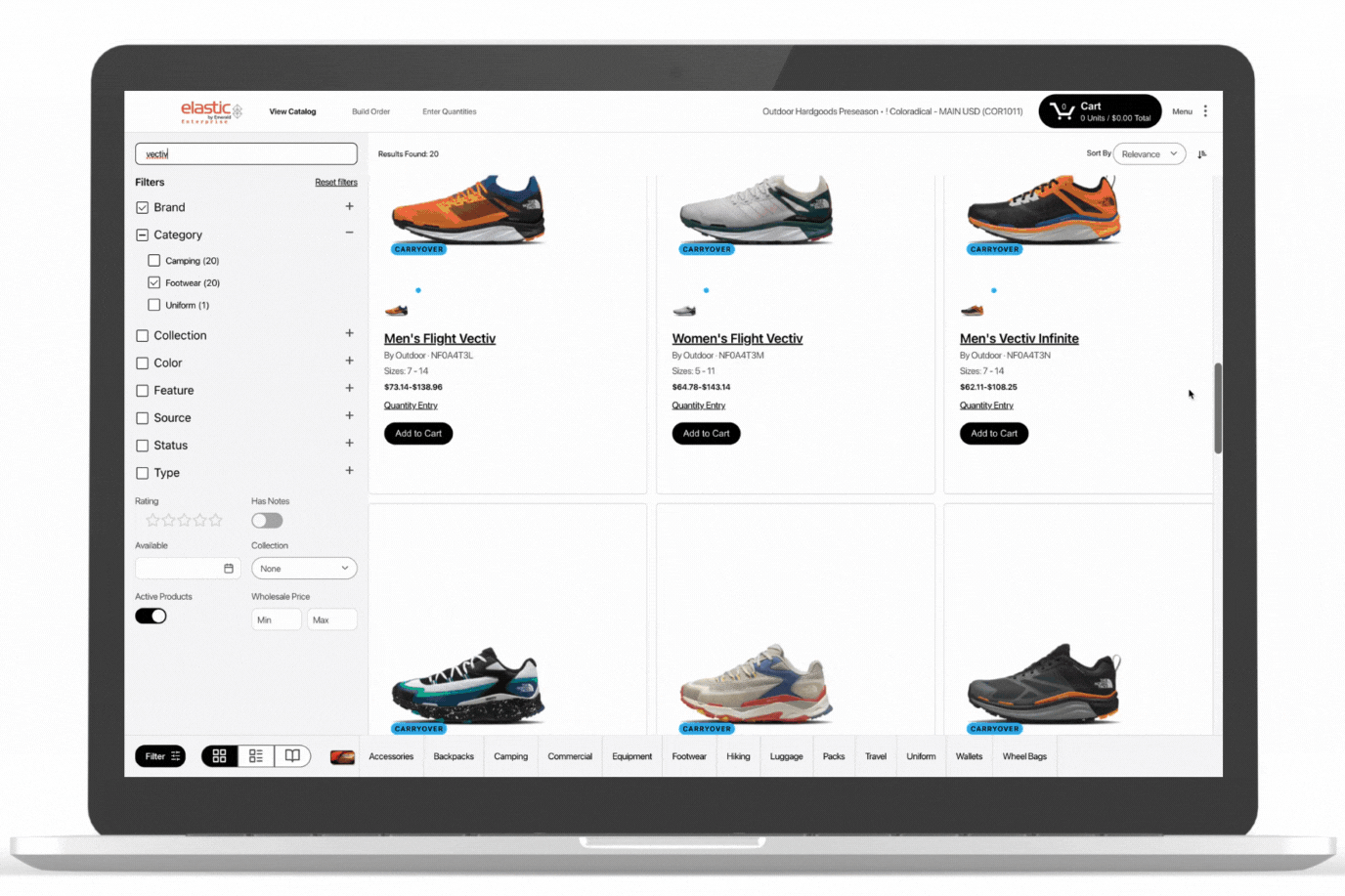CASE STUDY

ACHIEVING PRINT-FREE B2B SALES
How The North Face is Transforming Wholesale Commerce with Elastic Suite’s Digital B2B Solutions
Vision & Innovation
Consistent with the innovation of their iconic brand and outdoor products, The North Face (TNF) has achieved an industry first by eliminating mass printing of B2B sales catalogs and work books. TNF is not only the first major outdoor brand to accomplish this, but they are the first to do so among virtually all manufacturing verticals through the use of digital merchandising technology. And what is truly noteworthy about this achievement is that TNF has successfully overcome their retail partners’ strong reliance on traditional printed sales catalogs, while literally transforming the nature of wholesale merchandising.
This quantum shift in product purchasing behavior was driven by a strong vision and desire at TNF to better serve retailers with a much more collaborative approach to B2B sales. Core to that vision was optimizing TNF brand performance on behalf of retailers by creating the most inclusive and efficient product acquisition process. A strong digital sales and merchandising platform was needed to create a truly flexible and immersive purchasing experience to help retailers reach their full potential in managing complex and diverse product lines.
“What The North Face has accomplished by eliminating printed B2B sales materials and complete adoption of digital merchandising with their retail partners is truly groundbreaking. It confirms not only their prominence as an iconic global brand, but their status as an innovative leader within the entire manufacturing sector. As a result of that leadership, The North Face is transforming the landscape of wholesale merchandising and bringing the collaboration between brands and retailers to an entirely new level.”
Josh Reddin,
EVP, Elastic Suite
To make this possible, TNF helped pioneer the development of Emerald’s Elastic Suite digital merchandising platform to expand the boundaries for how reps and retailers can work together more effectively. In developing the right solution for their retail partners, TNF needed much more than just static digital catalogs. Providing retailers with features such as full assortment building, line showing functions and sell-in tools that were fully supported all the way to sell through were all central to TNF’s vision. These enhancements provided the foundation for achieving print-free B2B sales and driving the necessary behavioral shift in retailer purchasing.
The ROI and bottom-line impact for achieving print-free B2B sales at TNF comes in many forms. Relationships between TNF and their retail partners have become much stronger through the deep functionality and collaborative purchasing features provided through the use of this new technology. B2B print elimination brings with it the benefits of green business initiatives and brand enhancements as sustainability becomes increasingly important in the lifestyles and purchasing behavior of consumers. And eliminating printed materials from the commercial sales process creates efficiency-driven cost savings that flow directly through to the company’s bottom line. This case study overviews the impact of TNF’s print free B2B sales initiative in these three areas of retailer relationships, sustainability benefits, and cost savings.
Learning Summary

TNF is the first major global brand to eliminate mass printing of B2B sales and marketing materials

Elastic Suite is the platform helping to bring the TNF vision to life for their retailers

Print elimination ROI comes through stronger retailer relationships, sustainability and cost savings
Retailer Relationships
When TNF decided to pursue a B2B digital merchandising solution they faced a significant challenge in overcoming the outdoor industry’s reliance on printed marketing materials. There was a long-held and strong cultural resistance among many retailers against switching to a digital solution because of buyers’ tactile need for notation and marking up physical catalogs or sales work books. Understanding their retailer partners and following a truly collaborative approach when developing a digital solution was key in gaining the necessary behavioral shift with buyers. This collaboration stemmed from TNF’s desire to use cutting edge merchandising technology to enhance and customize the sales presentation while creating a much more intuitive interface with product lines.
TNF led the way in helping retailers better understand the limitations of printed materials. Because of their static nature there are inevitable accuracy problems with printed catalogs due to their inability to adjust to necessary product or line adjustments. It became clear that a digital merchandising solution could not only create flexible sales catalogs but enhance and customize the entire B2B sales experience. The Elastic solution was developed to empower the TNF sales team to create assortments that were designed specifically for individual retailers while more effectively managing their orders and their overall business all in one place.

“The North Face and Elastic came together at the perfect time with the purpose to enhance the buying and product engagement experience for our retailers. We had some really ambitious ideas for an assortment and merchandising tool that would move us beyond printed sales materials. Elastic had the creativity, dynamic vision and technology platform to help develop these ideas with us and bring them to life.”
Patrick Fitzmaurice,
Senior Sales Planning Manager, The North Face
As TNF product and merchandising teams worked closely to develop the best solution for retailers, they sought an interface that would provide buyers with the same tactile engagement they had with printed materials. The answer was developed through Elastic’s use of dynamic data as a technology bridge to create enhanced functionality and a richer purchasing experience beyond just basic digital catalogs. These dynamic data features include the ability to notate and rate products, intuitively create line assortments, account for real-time product color/style changes, stay informed of pricing fluctuations, allow for sales segmentation, manage overall product curation and create a more strategic product mix. This leads to showing the right product to the right customers and making the most effective use of time and resources for both TNF and their retail partners.
This enhanced merchandising technology and the depth of these new features was central in helping TNF to eliminate mass printing of B2B sales materials. And this fully-functional solution is not only welcomed but is now preferred by TNF retailers as indicated through their complete adoption of the technology.
“REI has found B2B merchandising technology to be an invaluable improvement to the product procurement process in terms of cost savings while generating sales enhancement benefits at retail. We are moving toward making the use of a standardized B2B ecommerce procurement platform a preferred standard for REI suppliers in the future.”
Stephanie Briggs,
Category Merchandise Manager, REI
Another key benefit for TNF and their retailers is that digital sales materials can be updated real time. This ability virtually eliminating product information errors when accommoding for ongoing line adjustments while significantly improving speed to market. TNF has reduced time to market by an average of one full month during each six-month sales season representing a 17% improvement. This enhancement gives both TNF and their retailers considerably more time to strategically manage the B2B sales process, lengthen the sales season and potentially boost sales volume.
Eliminating product information errors and better speed to market
TNF has improved product time to market with retailers by 17%

And beyond this major leap forward in B2B sales process efficiency, TNF has connected with their retailers on an entirely new level and interwoven the value of their iconic brand with their partners in a much more meaningful and profitable way. And not surprisingly, TNF is the first to do this and has set the industry standard for all others to attempt to follow.

Learning Summary

Overcoming retailers’ reliance on printed B2B sales materials requires a shift in buyer behavior

TNF followed a collaborative approach to create customized solutions based on retailer needs

Product information errors were eliminated with a 17% improvement in product speed to market
Sustainability Benefits
In addition to enhancing their relationships with retail partners, the Elastic platform is helping TNF strengthen their brand through measurable and more sustainable “green” business practices. Sustainability is a strong motivator for TNF in achieving elimination of printed B2B sales materials and in line with TNF parent company Vanity Fair Corporation’s participation in the Fashion Industry Charter For Climate Action. As a signatory to this agreement, VF Corporation has committed to a 30% reduction in greenhouse gas emissions by 2030 and net zero emissions by 2050.
In evaluating their approach to help achieve this goal, TNF discovered that the more focused their product segmentation strategy became an increasing number of catalog variations were needed. To address this trend, the company decided that mass printing an ever-larger quantity of catalogs was inconsistent with TNF’s vision both culturally and with their aim for more sustainable business practices.

“Corporations that are actively managing and planning for climate change and pursuing sustainable business practices secure an 18% higher return on investment (ROI) than companies that are not.”
Source: CDP (Carbon Disclosure Project) Worldwide, 2018.
Sustainability-minded consumers now represent the majority of shoppers and this segment is quickly expanding. According to Nielsen Research, more than 60% of global consumers say they will spend more on products from brands with sustainable business practices. This same research shows that millennials now represent the largest consumer demographic, with more than two-thirds of this group expressing brand loyalty to products that are linked to sustainability initiatives. TNF’s sustainability achievements are strongly aligned with this trend and translate into ongoing benefits in both brand affinity and profitability.
Learning Summary

Digital merchandising is an ideal solution for eliminating increasingly complex sales catalogs

TNF enhanced the sustainability of its business practices with measurable environmental impacts

Sustainable business practices translate to stronger consumer brand preference
Cost Savings
The printing costs associated with sales materials was previously a significant line item in the company’s B2B marketing budget that has now been eliminated entirely. While there are certainly costs associated with making the switch to digital merchandising, both TNF and their retailer partners enjoy the net benefits from efficiency-driven cost savings of a much more strategic, streamlined and paperless product procurement process.
When accounting for the costs of previously-printed sales catalogs and work books, TNF has experienced an annual cost reduction of 35% within their B2B sales and marketing budget. These savings have helped TNF fund the transition to digital merchandising technology that ultimately flows through to the bottom line by creating a lift in net profits. And this positive financial impact is only the beginning of the B2B sales process improvements for TNF from making the shift to the Elastic platform. Outside of the scope of this case study there are additional bottom-line benefits with a much larger impact on profitability through enhanced enterprise-wide process efficiencies and increased sales revenues.

Print elimination translates to a 35% reduction in the B2B sales and marketing costs

The potential for cost savings and revenue enhancements significantly raises the importance and strategic business value for utilizing a digital B2B merchandising platform like Elastic. Considering that this positive financial impact is directly connected to the company’s bottom line, these benefits are highly visible and create a tangible return for shareholders.
Learning Summary

TNF’s B2B print elimination generates measurable bottom-line cost saving

These savings represent a 35% reduction in B2B sales and marketing costs

Print elimination is only a fraction of the total positive financial impact of B2B digital merchandising
